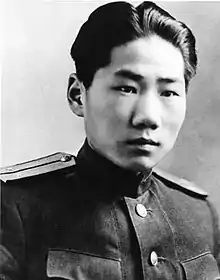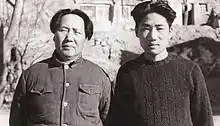Mao Anying
Mao Anying (Chinese: 毛岸英; pinyin: Máo Ànyīng; 24 November 1922 – 25 November 1950) was the eldest son of Mao Zedong and Yang Kaihui.
Mao Anying | |
|---|---|
 Mao Anying in a Soviet officer's uniform | |
| Born | 24 November 1922 Changsha, Hunan, China |
| Died | 25 November 1950 (aged 28) Tongchang, North Pyongan, North Korea |
| Allegiance | |
| Rank | |
| Battles/wars | World War II Chinese Civil War Korean War † |
| Spouse(s) | Liu Songlin (m. 1949–1950) |
| Relations | Mao Zedong (father) Yang Kaihui (mother) |
Educated in Moscow and a veteran of multiple wars, Mao was killed in action by an air strike during the Korean War.
Early life

Mao was born at Central South University Xiangya Hospital in Changsha, Hunan Province. His mother, Yang Kaihui, second wife of Communist Leader Mao Zedong, was executed by the Kuomintang in 1930. He and his younger brother, Mao Anqing, escaped to Shanghai. Their father was in Jiangxi province at the time, and they were enrolled into the Datong Kindergarten, which was run covertly by the Chinese Communist Party for the children of CCP leaders and operated by Dong Jianwu (董健吾) under the alias "Pastor Wang".[1] In 1933, after the Kuomintang expulsion of the CCP from Jianxi Soviet, support for the Datong Kindergarten dried up and Mao and his brother ended up on the streets.
World War II

In 1936, Mao was located by Dong and Kang Sheng and taken to Moscow, where he was enrolled with his brother Anqing at Interdom in the Soviet Union under the name "Sergei Yun Fu". His stepmother, He Zizhen would join them there after being wounded in battle; despite the fact that Mao father had left his mother for He, Anying had a good relationship with her and his-half sister Li Min who joined them in 1941.[2]
During the Second World War, Anying successfully petitioned Joseph Stalin to allow him and his brother Anqing to join the Soviet Red Army. Mao graduated from the Frunze Military Academy and the Lenin Military-Political Academy in 1943 and served as an artillery officer for the 1st Belorussian Front in the fight against the Third Reich in Poland, Czechoslovakia, and the final Battle of Berlin.[3][4]
In 1946, Mao returned to Yan'an, where he served under Kang Sheng in fighting against the Kuomintang and defeating them in the Shanxi Province, reaching the rank of Major General in the Peoples Liberation Army. Upon his return to Beijing, Mao became a Secretary and Translator for Li Kenong in the Intelligence Department of the CCP and also the Deputy Secretary of the CCP Branch for the Beijing General Machinery Factory.
Korean War and death
On June 1950, Mao requested to join the Chinese People's Volunteer Army (PVA) as an officer in the Korean War. PVA commander Peng Dehuai and other high ranking officers, fearing Mao Zedong's reaction if his favorite son was to be killed in combat, had long opposed allowing Mao to join the PVA and tried to prevent him from entering. Mao Zedong overrode Peng, who allegedly shouted "He is Mao Zedong's son. Why should it be anything else?"? Peng instead had Mao assigned to him as his secretary and Russian translator, under the pseudonym "Secretary Liu" at the PVA headquarters, located in caves near an old gold mining settlement which offered excellent protection from UN air attacks and far from the frontlines.[5][6]
On the evening of 24 November, two United Nations (UN) aircraft, P-61s on a photo reconnaissance mission, were seen overhead.[7] According to multiple Chinese eyewitnesses, sometime between 10:00am and noon on 25 November, four Douglas A-26 Invaders dropped napalm bombs in the area.[8][9] One of the bombs destroyed a makeshift building near the caves, killing Mao and another officer. Several conflicting reasons have been given as to why Mao was in the building, including suggestions that he was cooking food in violation of Chinese Army regulations,[1][7][10] fetching documents, or sleeping late due to night duties.[8]
His body was reportedly burnt beyond recognition and was only identified due the Soviet watch which was given to him by Joseph Stalin. Peng immediately reported his death to the Central Military Commission, but Zhou Enlai ordered the CMC and Politburo not to inform Mao Zedong. It was only until January 1951, when Mao Zedong asked his personal secretary Ye Zilong to have Mao transferred back to China did Ye inform him of the news. Mao was apparently buried in Pyongyang, in the Cemetery for the Heroes of the Chinese People's Volunteer Army. Some sources claim that Peng Dehuai's fall from grace after the Great Leap Forward and Cultural Revolution was connected to Mao Anying's death, for which Mao Zedong supposedly held Peng responsible.
Disputes Regarding Death
The only unit operating the A-26 in Korea at the time was the 3rd Bomb Group, of the United States Air Force (USAF). Some accounts have claimed, most likely incorrectly, that the pilot responsible was Captain G. B. Lipawsky of the South African Air Force.[11] However, the only aircraft flown by South African pilots in Korea was the Mustang fighter bomber, which was unlikely to have been mistaken for the larger, twin-engine A-26s.[8]
Some Chinese netizens would commemorate the day of Mao's death as "Chinese Thanksgiving" by eating and sharing photos of egg fried rice, which Mao was supposedly cooking at the camp.[12]
See also
References
- Chairman Mao Zedong and General Mao Anying, Chinese Military Leaders of the Korean War
- Oxana Vozhdaeva (4 October 2013). "How children of the world united at a Soviet school". BBC News. Retrieved 4 October 2013.
Mao's eldest son, Mao Anying, who was known in the home as Sergei Yun Fu.
- Pathanothai, Sirin. The Dragon Pearl. Simon and Schuster. 1994. p 163.
- National Interest. 25 April 2020 https://nationalinterest.org/blog/buzz/no-dynasty-china-how-maos-son-was-killed-korea-war-147856. Missing or empty
|title=(help) - National Interest. 25 April 2020 https://nationalinterest.org/blog/buzz/no-dynasty-china-how-maos-son-was-killed-korea-war-147856. Missing or empty
|title=(help) - Kruschev, Nikita. Memoirs of Nikita Kruschev, Vol 2. Pennsylvania State University Press. 2006. p 98.
- "彭德怀文革时被污有意害死毛岸英". Cul.sohu.com. Retrieved 13 November 2014.
- Sebastien Roblin, 2017, "A U.S. Bombing Run in North Korea Wiped Out Mao Zedong's Dynasty" National Interest (May 7), (Access: 17 March 2018.)
- 武立金 (2006). "第六章 血染大榆洞". 毛岸英在朝鲜战场 (in Chinese). 作家出版社. ISBN 978-7-5063-3717-5.
- Nanchu, Xing Hang, Page 94, McFarland Press, 2003, In North Korea: an American travels through an imprisoned nation ISBN 0-7864-1691-2, ISBN 978-0-7864-1691-2
- 66年前的今天:波兰裔南非飞行员杀害毛岸英. 网易新闻. 2016-11-25 (2017-03-22). A translated excerpt: "G. B. Lipawsky ... accumulated more than 12,000 hours of flight in World War II and North Korea. On November 24th, 1950 ... he ... attacked the command post of the Volunteers using napalm bombs."
- "Holiday of the Week: Chinese Thanksgiving". China Digital Times. 24 November 2016.